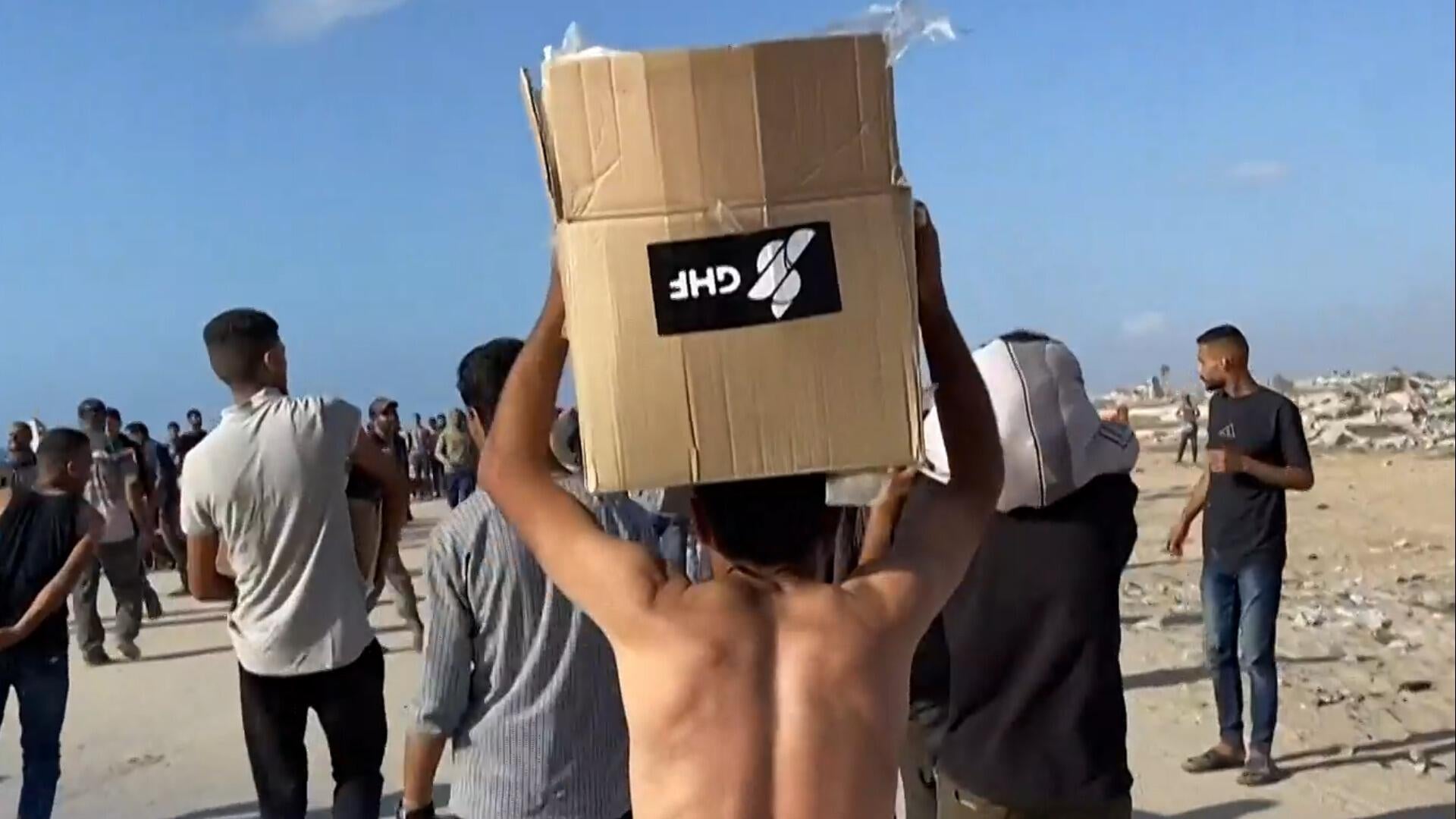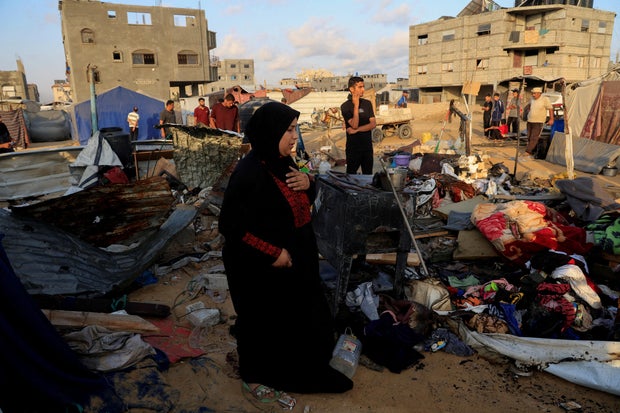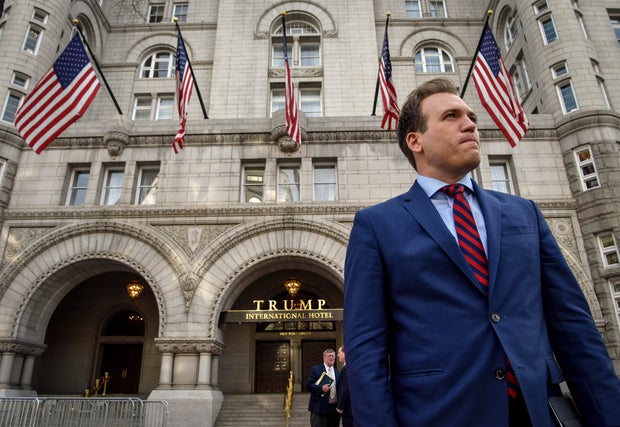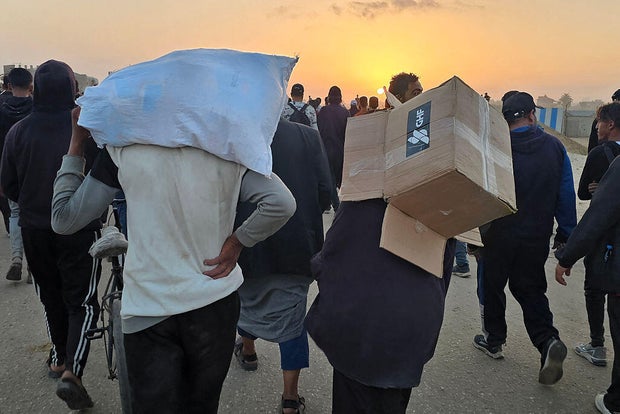U.S.-backed Gaza aid program faces scrutiny

It appeared on Wednesday that President Trump likely still has some deal-making to do before he can claim to have brokered a ceasefire between Israel and Hamas to end the devastating war in Gaza. Mr. Trump said in a Tuesday evening social media post that Israel had "agreed to the necessary conditions to finalize" a 60-day ceasefire, and he called on Hamas to accept the deal, warning the U.S.- and Israeli-designated terrorist group that "it will not get better — IT WILL ONLY GET WORSE."
Israeli sources told CBS News on Wednesday that while there was strong backing in Prime Minister Benjamin Netanyahu's cabinet for the terms in the proposal, Israel was not committing to it yet, stressing that the government had voiced its backing to U.S. officials for a proposed framework for a ceasefire deal, not a final agreement.
In a statement, Hamas credited mediators Qatar and Egypt for having "exerted intensive efforts to bridge the gap between the parties and reach a framework agreement that would pave the way for a serious round of negotiations."
"We are approaching this with a high sense of responsibility and are conducting national consultations to discuss the proposals presented by the mediators," Hamas said, reiterating its long-standing calls for a truce that brings the war to an end, sees Israeli forces withdraw from Gaza, "and urgently delivers relief to our people in the Gaza Strip."

Mr. Trump didn't offer any details of the proposed deal in his post on Tuesday evening, but he said that Qatar and Egypt — which have been key partners to the U.S. as it attempts to broker an agreement to end the nearly two-year war — would "deliver this final proposal."
Israeli Foreign Minister Gideon Sa'ar, in a post on social media Wednesday, said there was "a great majority in the government and also among the people for a framework to release hostages. If there is an opportunity to do so — we must not miss it!"
But that claim of cohesion may belie a potentially significant hurdle for Netanyahu as he prepares to head to Washington this weekend to meet with Mr. Trump, who's made it clear he wants to see a deal to end the war within days.
Numerous Israeli media outlets reported Wednesday that one of the most far-right members of Netanyahu's cabinet, Security Minister Itamar Ben-Gvir, had called on far-right nationalist Finance Minister Bezalel Smotrich to join him in blocking the government's approval of the ceasefire deal.
Neither Smotrich nor Ben-Gvir confirmed any discussion about blocking the agreement, but in a short post on social media, Ben-Gvir said the war in Gaza should not end "a moment before defeating Hamas." Both men have been vocal in rejecting peace deals with Hamas, insisting that the group must be completely destroyed, not negotiated with.
Yair Golan, leader of the Israeli opposition Democrats party, accused Smotrich and Ben-Gvir in a social media post of "leading a bloc to prevent the return of the hostages." He said they "do not deserve to sit around the government table. And whoever continues to allow them to sit there does not deserve to lead Israel for even one more day."
While the real prospects of Israel and Hamas agreeing to a ceasefire in the short time frame that Mr. Trump is hoping for remained unclear, even the suggestion that peace could be looming may raise hopes for Gazans who risk their lives every day just to line up lining up for food.
The Hamas-run Gaza Ministry of Health says at least 640 civilians have been shot to death in recent weeks trying to access desperately needed humanitarian supplies, including more than 400 at distribution sites run by the heavily criticized U.S.- and Israeli-backed Gaza Humanitarian Foundation.
Since it began operating in the war-torn enclave on May 26, GHF has faced near daily claims of aid-seekers being killed by Israeli forces as they try to reach its four hubs in Gaza.
Earlier this week, more than 170 humanitarian groups called for the opaquely run organization — which has never revealed its funding or management structure — to be disbanded and all aid efforts in Gaza to be reorganized under the long-established United Nations-led system. Those international humanitarian efforts have been largely blocked by Israel since March.
The Israeli military says it works with the GHF to enable aid distribution without the risk of food and other goods being stolen by Hamas.
The Trump administration has backed that reasoning and refused to support other means of food dispersal in Gaza, instead calling on other nations and institutions to work with the GHF, which replaced some 400 international aid distribution points in the Palestinian territory with just four of its hubs. Those hubs are run by armed U.S. private security contractors, and the Israeli military controls access to them.
All established humanitarian agencies have refused to work with the GHF, saying it forces Palestinians to dislocate and trek for miles to reach its hubs and that it violates basic humanitarian principles, but the Trump administration announced late last week its first public support for the group: $30 million in funding.
The State Department wouldn't say, when that funding was announced, if the funds had already been transferred to GHF, or which U.S. government account they would come from.
The GHF has declined to respond to multiple questions from CBS News about its connections with the U.S. and Israeli governments and its funding, and it had, until this week, also declined to be interviewed by CBS News about its operations. On Tuesday, however, the GHF's director, American evangelical reverend Johnnie Moore, a former adviser to President Trump on religious matters, agreed to an interview via Zoom.

Our first question was about the reports CBS News has received since GHF began its operations, directly from doctors and eyewitnesses, that Israeli soldiers have repeatedly opened fire on unarmed civilians trying to reach its aid hubs.
"I do not want to diminish these reports, but we can't control what happens outside our distribution sites," Moore told CBS News.
Asked how many more people would die before GHF changed the way it operates, Moore called the framing of the question "inappropriate," and said the group's "whole reason for existing is to give food to these people so they can live."
He repeated his previous calls — and those of the White House — for the United Nations and its various humanitarian agencies to join GHF's efforts in Gaza.
"We've said again and again to the U.N., to the WFP (World Food Program), join us in this effort," Moore said, before asking CBS News' correspondent, "with respect, why don't you join us? I'm asking you to help us run the operation if you think there is a better way to do this."
Asked how GHF has been able to verify who exactly receives the aid it provides on the ground — which Moore has stressed does not reach Hamas — the reverend responded with a question: "Do you have anything positive to say about what we are doing?"

"Do you think it is acceptable that people die every day trying to access aid? Is there not a better way to do this?" CBS News asked again.
"We have made a decision that it is worth working in a war zone," Moore said, "as deadly as it is, because Gazans deserve food."
Moore would not respond to questions about how GHF operates or who funds the organization, beside the $30 million contribution announced this week by the Trump administration.
Tucker Reals is CBSNews.com's foreign editor, based in the CBS News London bureau. He has worked for CBS News since 2006, prior to which he worked for The Associated Press in Washington, D.C., and London.










